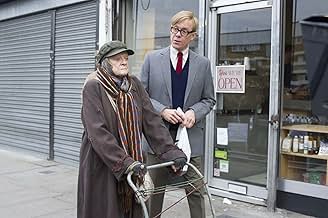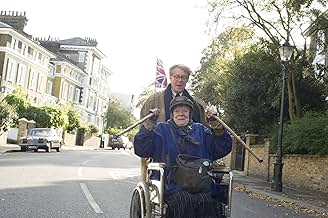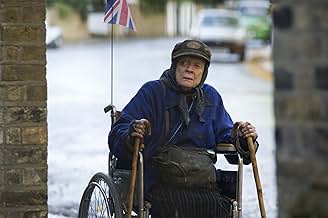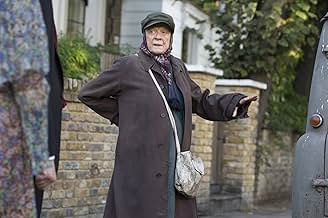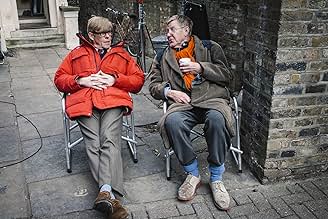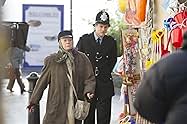AVALIAÇÃO DA IMDb
6,7/10
34 mil
SUA AVALIAÇÃO
Um homem forma um vínculo inesperado com uma mulher que mora em uma van.Um homem forma um vínculo inesperado com uma mulher que mora em uma van.Um homem forma um vínculo inesperado com uma mulher que mora em uma van.
- Indicado para 1 prêmio BAFTA
- 1 vitória e 8 indicações no total
Avaliações em destaque
Maggie Smith never disappoints. She is such an amazing actress and continues to be in "The Lady in the Van." Such an interesting true story of a very odd woman, this film is very endearing. The chemistry between Maggie Smith and Alex Jennings is very enjoyable to watch. Their relationship had a sort of codependency between them that was really fueled by a real caring for each other for different reasons. Director Nicholas Hytner did a great job of portraying the comedy found in this story. And that is due to the great acting of Maggie Smith, whom I cannot say enough about. Her recent Golden Globe nomination for Best Actress in a Motion Picture- Comedy was well deserved and although she didn't take home the trophy, her performance is still one to be heavily applauded.
Like all the best English comedies, the humor in "The Lady in the Van" is founded on character and in eccentricity but then we should expect nothing less from the pen of the great Alan Bennett. This is mostly a true story we are told and it's the story of a very eccentric lady and one, or is it two, quite eccentric men. The lady is Mary, or is it Margaret, Shepherd who might be considered homeless were it not for the van she lives in. The somewhat eccentric man is Bennett himself. I said two because in this case we get two Bennetts for the price of one, Alan the writer and Alan the householder and they are both played by Alex Jennings.
Miss Shepherd really existed and she's the lady who, at Bennett's request. moved her van from the street outside his house, where she had parked it, into his driveway. Initially she was due to stay a few months but ended up parking there for 15 years. Bennett turned the story of her stay first into a novella and then into a play and now, under the direction of Nicholas Hytner, into a film and a beautiful job he's made of it.
Of course, for the purpose of dramatic and comic effect Mr Bennett has taken liberties, adding bits here and there including a delightful phantasmagorical ending. He also surrounds himself and Miss Shepherd with a host of other characters, some almost as eccentric as they are. Recreating the part she played on stage Maggie Smith is magnificent in the title role. Of course, you could say Maggie has been playing variations of Jean Brodie for the past 45 years. It's easy to see Miss Brodie in the put-downs of the Dowager, Countess of Grantham had Jean been born into a different generation or class and it's not much of a step to see Miss Shepherd as an older, very much down-on-her-luck Jean Brodie. A third Oscar is certainly not out of the question.
Jennings, too, has Bennett off to a tee and there's lovely support from the likes of Frances De La Tour, Roger Allam and Deborah Findlay as sundry neighbors while the entire cast of Bennett's "The History Boys" manage to pop up in one form or another. If it feels slighter than some of Bennett's other offerings it may simply be because here he is writing about someone we would probably pass in the street without looking twice at. Of course, if on meeting Miss Shepherd in the street we knew what we know now, we might indeed give her a second or even a third glance; we might even invite her to move her van into our driveway. Slight? Not a bit of it.
Miss Shepherd really existed and she's the lady who, at Bennett's request. moved her van from the street outside his house, where she had parked it, into his driveway. Initially she was due to stay a few months but ended up parking there for 15 years. Bennett turned the story of her stay first into a novella and then into a play and now, under the direction of Nicholas Hytner, into a film and a beautiful job he's made of it.
Of course, for the purpose of dramatic and comic effect Mr Bennett has taken liberties, adding bits here and there including a delightful phantasmagorical ending. He also surrounds himself and Miss Shepherd with a host of other characters, some almost as eccentric as they are. Recreating the part she played on stage Maggie Smith is magnificent in the title role. Of course, you could say Maggie has been playing variations of Jean Brodie for the past 45 years. It's easy to see Miss Brodie in the put-downs of the Dowager, Countess of Grantham had Jean been born into a different generation or class and it's not much of a step to see Miss Shepherd as an older, very much down-on-her-luck Jean Brodie. A third Oscar is certainly not out of the question.
Jennings, too, has Bennett off to a tee and there's lovely support from the likes of Frances De La Tour, Roger Allam and Deborah Findlay as sundry neighbors while the entire cast of Bennett's "The History Boys" manage to pop up in one form or another. If it feels slighter than some of Bennett's other offerings it may simply be because here he is writing about someone we would probably pass in the street without looking twice at. Of course, if on meeting Miss Shepherd in the street we knew what we know now, we might indeed give her a second or even a third glance; we might even invite her to move her van into our driveway. Slight? Not a bit of it.
"The Lady in the Van"
I added this movie to my watch-list months ago, as soon as I saw the premise and Maggie's name in it's description. Just watched it. And it's EXACTLY what I expected it to be. :)
The plot: (without spoilers)
It's a poignant portrayal of a homeless woman who finds shelter when a lonely writer out of his timidness (don't confuse it with politeness, although being England, timid is good, too) lets her park her van in his driveway. Their bond, which was supposed to end within a few months, lasts almost 15 years.
The review: (without spoilers)
From the starting, you'll be hooked to the character of Maggie Smith, thanks to her glorious acting and the delightful character, Mary/Margaret/Miss Sheperd, she brings life to. Alex Jennings, who plays Alan, the man who lets her stay in her driveway, is quite a delightful actor himself. I don't think I've seen him in any other flicks. Yet.
Regardless to say, the acting is superb. The plot is adorable and heartbreaking, both at the same time. It's a perfect little drama movie with loads of charming humor, mainly delivered by Maggie. Yes, it gets a bit, as the other reviewers have put it, "dull" in the second half, but I think it's perfectly fine, because going in halfway, I expected nothing else. By the time it ended, there was a sense of contentedness in my heart. Also, it had stopped raining, not that THAT matters! :P
In short, this movie is a perfect, "bundle of joy".
I give it: 7.5/10
Also, I have noticed most of the British flicks go unnoticed, here on IMDb. I really wonder why. I have been tracking this one here for months and still it has only 10K or so votes and a lower rating than it deserves. Anyway, I hope this review will attract more viewers? I don't know, but one CAN hope.
That's it for now folks! :)
I added this movie to my watch-list months ago, as soon as I saw the premise and Maggie's name in it's description. Just watched it. And it's EXACTLY what I expected it to be. :)
The plot: (without spoilers)
It's a poignant portrayal of a homeless woman who finds shelter when a lonely writer out of his timidness (don't confuse it with politeness, although being England, timid is good, too) lets her park her van in his driveway. Their bond, which was supposed to end within a few months, lasts almost 15 years.
The review: (without spoilers)
From the starting, you'll be hooked to the character of Maggie Smith, thanks to her glorious acting and the delightful character, Mary/Margaret/Miss Sheperd, she brings life to. Alex Jennings, who plays Alan, the man who lets her stay in her driveway, is quite a delightful actor himself. I don't think I've seen him in any other flicks. Yet.
Regardless to say, the acting is superb. The plot is adorable and heartbreaking, both at the same time. It's a perfect little drama movie with loads of charming humor, mainly delivered by Maggie. Yes, it gets a bit, as the other reviewers have put it, "dull" in the second half, but I think it's perfectly fine, because going in halfway, I expected nothing else. By the time it ended, there was a sense of contentedness in my heart. Also, it had stopped raining, not that THAT matters! :P
In short, this movie is a perfect, "bundle of joy".
I give it: 7.5/10
Also, I have noticed most of the British flicks go unnoticed, here on IMDb. I really wonder why. I have been tracking this one here for months and still it has only 10K or so votes and a lower rating than it deserves. Anyway, I hope this review will attract more viewers? I don't know, but one CAN hope.
That's it for now folks! :)
A very entertaining, and occasionally touching, film written by Alan Bennett, a British National Treasure - though I'm sure he must be irritated, if not sickened, by being so described. His unique voice is instantly recognisable: self-knowing, self-mocking, never ever self-regarding. In spite of a string of stage and screen successes, he is essentially a man of letters: there is a literary quality about his work, and a good deal of his humour emerges from the contrast between the elegance of his sentences and the earthy, realistic observations they contain.
Bennett adapted his memoir about Miss Shepherd, whose residence is the eponymous vehicle (one of a series of vehicles, as it turns out) that occupies his driveway for fifteen years, for the stage, which brought director Nicholas Hytner and actors Maggie Smith and Alex Jennings on to the project. All three return for this film version, and an excellent job they make of it.
Bennett slyly juggles a number of subplots without you ever really being aware that is what they are. When they are finally identified and tied up in a package, it feels a little too neat and tidy after all that sprawl - an interesting comparison is Charlie Kaufmann's bleaker vision of a writer's struggle with a piece of work, Synechdoche New York - but Bennett's droll dialogue, and his clear-sightedness over the way compassion intertwines with guilt, compensates for the sense of well-made screenplay that dominates the closing section of the film.
Highly recommended.
Bennett adapted his memoir about Miss Shepherd, whose residence is the eponymous vehicle (one of a series of vehicles, as it turns out) that occupies his driveway for fifteen years, for the stage, which brought director Nicholas Hytner and actors Maggie Smith and Alex Jennings on to the project. All three return for this film version, and an excellent job they make of it.
Bennett slyly juggles a number of subplots without you ever really being aware that is what they are. When they are finally identified and tied up in a package, it feels a little too neat and tidy after all that sprawl - an interesting comparison is Charlie Kaufmann's bleaker vision of a writer's struggle with a piece of work, Synechdoche New York - but Bennett's droll dialogue, and his clear-sightedness over the way compassion intertwines with guilt, compensates for the sense of well-made screenplay that dominates the closing section of the film.
Highly recommended.
"Lady in the Van" from 2015 is the "mostly" true story of playwright Alan Bennett's relationship with a woman who lived in various vans parked in his driveway for fifteen years. Bennett here is played by Alex Jennings, and the lady, Miss Shepherd, Maggie Smith.
Miss Shepherd, who smells awful from not bathing, lives in a crowded van and moves it from place to place, staying until she's thrown out or until she hears music. When she's told to move or do something else, she yells, as only Maggie Smith can do, "I'm a sick woman! Dying possibly!" Alan finds it impossible to break from her, though he tries. She prays very fervently and one time tells him that she spoke to the Virgin Mary at the post office. When he asks if the van is insured, she says she doesn't need it, she's insured in heaven. "So what happens if you have an accident?" Alan asks. "Who pays? The Pope?"
Alan is gay, though his friends are always trying to fix him up with a woman. One day Miss Shepherd says, "All those people who come and go in the dark, I know who they are." "Oh, Jesus," he says under his breath. "They're Communists!" she hisses. "Otherwise they wouldn't come and go in the dark."
Miss Shepherd is a woman of mystery - Alan finally learns that she studied piano, speaks fluent French, and was a nun. She also at times is seen going to someone's house in the dead of night. A man opens the door and comes outside. And someone stops by her van from time to time, and she gives him money.
In the end, we learn who these people are, her story of the convent, the history of her piano-playing, why she prays all the time, and who the men are.
Alex Jennings is perfect as Bennett (who appears at the end of the movie). He has his voice down pat, and in the film, there are two Alans - the writer Alan and the observer Alan, who talk with one another throughout the film. It's Alan who lives in the real world who encourages the writer Alan to be helpful to Miss Shepherd.
I am so privileged to have seen Maggie Smith in "Lettice and Lovage," one of my greatest evenings in the theater, where I laughed until I cried. At the end of that play, she gets on the phone and does a serious, touching monologue. She does the same here. Instead of the crazy homeless lady with the plastic bags we see and laugh at and wonder about during the play, she does a monologue that tells us who she is, and about her pain, heartbreak, and disappointments. "Why did you choose to be homeless?" Alan asks. "I didn't choose," she insists. "It was chosen for me."
A wonderful film about an uptight, cold man and a disturbed religious bag lady - you won't soon forget it.
Miss Shepherd, who smells awful from not bathing, lives in a crowded van and moves it from place to place, staying until she's thrown out or until she hears music. When she's told to move or do something else, she yells, as only Maggie Smith can do, "I'm a sick woman! Dying possibly!" Alan finds it impossible to break from her, though he tries. She prays very fervently and one time tells him that she spoke to the Virgin Mary at the post office. When he asks if the van is insured, she says she doesn't need it, she's insured in heaven. "So what happens if you have an accident?" Alan asks. "Who pays? The Pope?"
Alan is gay, though his friends are always trying to fix him up with a woman. One day Miss Shepherd says, "All those people who come and go in the dark, I know who they are." "Oh, Jesus," he says under his breath. "They're Communists!" she hisses. "Otherwise they wouldn't come and go in the dark."
Miss Shepherd is a woman of mystery - Alan finally learns that she studied piano, speaks fluent French, and was a nun. She also at times is seen going to someone's house in the dead of night. A man opens the door and comes outside. And someone stops by her van from time to time, and she gives him money.
In the end, we learn who these people are, her story of the convent, the history of her piano-playing, why she prays all the time, and who the men are.
Alex Jennings is perfect as Bennett (who appears at the end of the movie). He has his voice down pat, and in the film, there are two Alans - the writer Alan and the observer Alan, who talk with one another throughout the film. It's Alan who lives in the real world who encourages the writer Alan to be helpful to Miss Shepherd.
I am so privileged to have seen Maggie Smith in "Lettice and Lovage," one of my greatest evenings in the theater, where I laughed until I cried. At the end of that play, she gets on the phone and does a serious, touching monologue. She does the same here. Instead of the crazy homeless lady with the plastic bags we see and laugh at and wonder about during the play, she does a monologue that tells us who she is, and about her pain, heartbreak, and disappointments. "Why did you choose to be homeless?" Alan asks. "I didn't choose," she insists. "It was chosen for me."
A wonderful film about an uptight, cold man and a disturbed religious bag lady - you won't soon forget it.
Você sabia?
- CuriosidadesThis movie was shot in the actual house on the street where the events took place, Gloucester Crescent in Camden Town. Some of the same people still lived there when the star prop arrived, decades later.
- Erros de gravaçãoMargaret/Mary is shown parking her new Commer van in the drive of Alan Bennett's house and she pulls up on the handbrake in the middle of the van, where a handbrake would normally be. In fact Commer vans had their handbrake to the right of the driver's seat between the seat and the door - not between the two front seats.
- Citações
Rufus: Sorry, you can't park here.
Miss Shepherd: No, I've had guidance. This is where it should go.
Rufus: Guidance? Who from?
Miss Shepherd: The Virgin Mary. I spoke to her yesterday. She was outside the post office.
Rufus: What does she know about parking?
- Cenas durante ou pós-créditosDuring the first part of the credits, a young Margaret can be seen playing the piano at her concert in King's Hall.
- ConexõesFeatured in Alan Bennett at 80: Bennett Meets Hytner (2014)
- Trilhas sonorasPiano Concerto No. 1 In E Minor, OP. 11
Written by Frédéric Chopin
Performed by Clare Hammond and BBC Concert Orchestra
Orchestra Leader Charles Mutter
[The principal piano piece that recurs throughout the film is Chopin's Piano Concerto 1, using both the slow middle (second) movement "romanza" and the quick final (third) movement "rondo". Alfred Cortot was especially associated with playing Chopin's piano oeuvre.]
Principais escolhas
Faça login para avaliar e ver a lista de recomendações personalizadas
- How long is The Lady in the Van?Fornecido pela Alexa
Detalhes
- Data de lançamento
- Países de origem
- Central de atendimento oficial
- Idiomas
- Também conhecido como
- The Lady in the Van
- Locações de filme
- 23 Gloucester Crescent, London, Greater London, Inglaterra, Reino Unido(Alan Bennett's house where the events actually occurred)
- Empresas de produção
- Consulte mais créditos da empresa na IMDbPro
Bilheteria
- Orçamento
- US$ 6.000.000 (estimativa)
- Faturamento bruto nos EUA e Canadá
- US$ 10.021.175
- Faturamento bruto mundial
- US$ 41.387.687
- Tempo de duração1 hora 44 minutos
- Cor
- Mixagem de som
- Proporção
- 1.85 : 1
Contribua para esta página
Sugerir uma alteração ou adicionar conteúdo ausente







